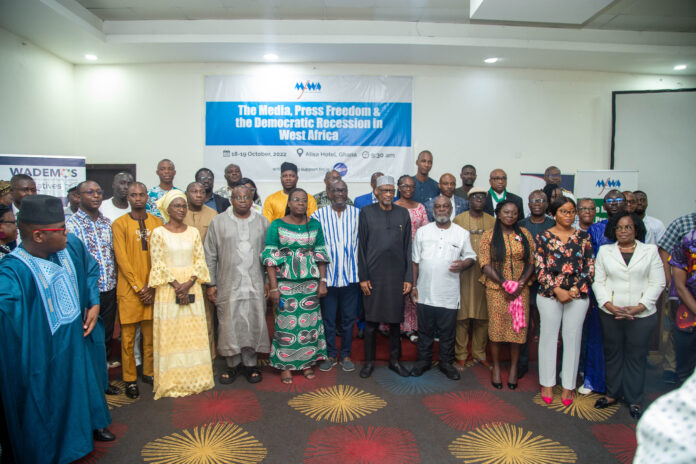
A two-day regional conference on the current democratic recession in West Africa closed with a number of recommendations, along with a proposal that ECOWAS works with civil society to initiate a strategic response to the democratic rollback in the sub-region
The conference which was held in Accra, Ghana focused specifically on the impact of democratic rollback on media and press freedom in West Africa. The conference hosted experts on governance and democracy, and media practitioners from across the sub-region who collectively proposed that the ECOWAS Commission collaborates with the West Africa Coalition for Media Freedom and Good Governance established by the Media Foundation for West Africa (MFWA) to deploy a holistic intervention to the democratic restoration in the region.
They also proposed that ECOWAS collaborates with the Regional Coalition to adopt and implement well-defined protocols for the protection of journalists especially those in areas afflicted by coup d’états and other insurgencies.
The conference which was on the theme: The Media, Press Freedom and The Democratic Recession in West Africa came off from October 18 – 19, 2022, and saw participants from across all 16 countries in West Africa. Key representatives from the ECOWAS were also present to contribute to the conversation.
Democratic recession in West Africa
West Africa, until recently, enjoyed a reputation as Africa’s bastion of democracy. From the early 90s, the region had increasingly seen democratization after Benin set the pace with elections in 1991 and Ghana followed in 1992. Indeed, by the early 2000s all countries in the subregion were democracies.
However, the 2020s have been shaping up to be the era of serious rollback on the democratic gains with the setbacks including the tendency for democratically elected presidents to tweak constitutions to change term limits in order to elongate their stay in office. The most significant of all the setbacks has been the recent wave of military coups d’état which have resulted in the overthrow of presidents and the heads of states of Mali, Burkina Faso and Guinea.
Other significant indicators of democratic recession in the region include shrinking civic spaces in almost every country in the region. Also, attacks, arbitrary arrests and detention of journalists and activists have become rampant in countries in the sub-region. In the last two years alone, for example, data from MFWA’s monitoring show that there have been close to 200 incidents of media freedom and freedom of expression violations.
It was against this backdrop that the MFWA, organized the two-day regional conference which hosted experts and key stakeholders in the region to discuss the current democratic recession to gauge the problem and proffer solutions.
Key learnings from the regional conference
The main diagnosis was that there was a generally weakened press environment as a result of increased violations of freedom of expression and of the press with the adoption of repressive laws, imposion of harsh penalties for minor offenses including imprisonment and crippling fines on journalists and the media. Economic hardships that journalists face from a widespread culture of poor remuneration and the tendency for politicians to establish media houses and thus skew professionalism have all contributed to the weak media environment in the subregion.
Key recommendations
Participants were of the resolution that even with all of its shortcomings, democracy remains the best form of governance to guarantee civic liberties, free civic space and freedom of the press in the subregion and therefore, the democratic rollback must be stemmed. To this, they committed to engaging, collaborating, and supporting ECOWAS to mainstream issues of press freedom in its democratic governance interventions as well as significantly contributing towards the realization of the ECOWAS of people.
Also, participants agreed that the media remains crucial for countering the democratic recession and therefore, ECOWAS, must work closely with the media to roll out a comprehensive strategy to curtail the recession. They proposed an annual meeting between the ECOWAS and the West Africa Coalition for Media Freedom and Good Governance deliberate on emerging issues and proffer solutions.
Participants called on the ECOWAS to set up a Media Development Fund that will support struggling media organizations to improve their capacities to work in the region.
It was also recommended that the Coalition through the MFWA formally requests an embedded staff at the ECOWAS Commission to facilitate engagements at the regional level. This will serve as a formal link between the media in West Africa and ECOWAS.
It was recommended that a Memorandum of Understanding (MoU) should be signed to formalise this arrangement.